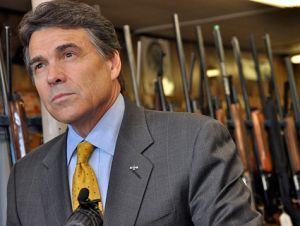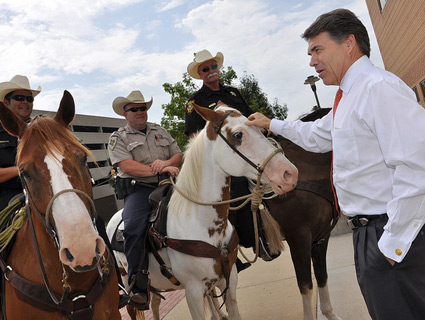
Texas Gov. Rick Perry is a frontrunner for the GOP presidential nomination.<a href="http://www.flickr.com/photos/rickperry/6005610000/sizes/z/in/photostream/">Rick Perry</a>/Flickr
Mary Jane Martinez’s son Jimmy entered the Texas criminal justice system in 2003 because he missed his school bus. He was charged with truancy and destruction of property (for throwing rocks) and sent to live in a county juvenile detention center for a sentence of six months. After five months, instead of being released, he was transferred to an academy 400 miles away, managed by the Texas Youth Commission, the agency that oversees detention and treatment centers across the state. Jimmy finally came home, four years after he was sent away, a period his mother now describes as a living hell. His best friend had been murdered, and Jimmy had been beaten and raped—both, Mrs. Martinez testifed, by TYC guards.
“It just made him worse,” Martinez says of the treatment. “My son has PTSD now. He’s schizo.” Unable to find a job after getting out, he was arrested for burglary and landed in a prison facility eight hours away from his native San Antonio.
Martinez’s story is hardly an outlier. For years, the Texas juvenile justice system was wracked by reports of rape, unsanitary conditions, and physical abuse. According to statistics submitted by the TYC in 2007, 83 percent of residents who requested counseling that year were ultimately diagnosed with post-traumatic stress disorder. At one youth facility in central Texas, the mistreatment and squalid conditions (feces on the walls and bed-sheets, steel bars blocking fire escapes) were so bad they left no choice but for the agency to shut it down entirely.
Gov. Rick Perry did not take swift action to address the problem, which his office knew about for years. Allegations of systematic mistreatment at TYC facilities first came to the Governor’s desk in 2001, when then-Rep. Dick Armey (R-Texas) forwarded along a complaint that his office had received. That was six years before media coverage of the conditions in juvenile detention centers launched a public scandal. And critics of Perry, who is now a frontrunner for the GOP presidential nomination, point out that he received tens of thousands of dollars from lobbyists and executives for a firm tied to some of the worst abuses.
Far from the picture initially painted by Perry, of a shocking scandal that was dealt with swiftly and emphatically, his administration had sat on the concerns for years.
The TYC’s own numbers tell the tale. The commission officially reported 535 cases of abuse at its facilities in 2002, more than double the total from just four years earlier. Likewise, the number of residents diagnosed with mental illnesses skyrocketed during that same period, from 27 percent in 1995 to nearly half in 2002. And despite his office’s initial denials, top Perry staffers had been formally briefed on abuses at juvenile justice facilities as early as 2005. In 2006, President Bush’s Department of Justice even initiated a probe of the TYC conditions, but declined to intervene because it was not able to prove that any victims sustained “bodily injury.”
“I think that prior to the abuse coming out, everybody dropped the ball—and I mean that by like everbody that was running the institution you know, everybody that had complaints, that knew about that complaints and did not bring it forward out of fear of retaliation, everybody dropped the ball,” says Ana Yanez-Correa, executive director of the Texas Criminal Justice Coalition, a watchdog group that’s pushed for more lenient sentencing guidelines.
Perry, for his part, tried to change the subject. “I think this ‘When did you know? When did you know it? Do you think someone should have done more?’ is missing the point of how are we making progress to getting these kids the protections that they need,” he told reporters after the Austin American-Statesman reported on his administration’s complicity in the abuses. Perry called on the Statesman to retract its report (the paper refused).
It was only when the public found out about the TYC abuses that Perry sprang into action—and even then, some of the worst offenders got off easy. In February of 2007, the Dallas Morning News broke the news that multiple employees at the West Texas State School, a juvenile detention center in the small town of Pyote, had filed formal complaints alleging that staffers had sexually assaulted inmates and traded favors for sex. But the agency, rather than investigating the claims, had simply deferred the charges to the local level, where the charges were dropped.
Over the next six months, the Morning News and the Texas Observer fleshed out the story: The abuses weren’t unique to Pyote; all in all, the TYC had received 750 complaints of sexual misconduct from inmates since 2000, and it had, for the most part, failed to act. One prison guard who was accused of sexually assaulting inmates was found to be a registered sex offender already—and unbeknownst to the agency, was living on site with a 16-year-old boy.
The pattern that was established from the stories was clear: complaints from employees and inmates were being passed up to the chain of command and then—nothing.
In the hands of the TYC Board of Supervisors, which consisted almost entirely of major GOP donors rather than qualified criminal justice professionals, the complaints had a tendency to die. (Texas’ Deputy Attorney General for Criminal Justice, Don Clemmer, later testified that his office didn’t have the resources to investigate allegations of sexual abuse at a TYC facility in Ward County because at the time the local agent was busy investigating charges of voter fraud by a 68-year-old Hispanic woman.)
In response to the outcry, Perry appointed his former chief of staff, Jay Kimbrough, to investigate the abuses, and hired an independent ombudsman to sit on the board.
But reports continued to pile up. In late 2007, Texas shut down three TYC facilities in quick succession, the last coming in October, when it shuttered a Coke County juvenile detention center after the ombudsman reported unsanitary conditions, such as feces in the shower and blocked-off emergency exits. Two months later, seven former inmates filed suit alleging that they had been sexually abused by guards at the facility, which was operated by the Florida-based private contractor, GEO Group.
Kimbrough eventually put forward a list of 56 recommended reforms designed to consolidate management of the TYC facilities and reduce overcrowding. Thousands of kids, like Martinez’s son Jimmy, were spending years at state facilities for non-violent offenses, and the juvenile detention system had the opposite of the intended effect; rather than rehabilitating kids and preparing them for reentry, it was a breeding ground for mental illness and a stepping stone to recidivism. Investigators criticized the TYC for its “culture” of punishment—a pervasive use of pepper spray, for instance, for even the most marginal of missteps.
With a nudge from activists like Yanez-Correa, the state pushed through a parents’ bill of rights, a prohibition on housing non-violent offenders at TYC facilities, and renewed emphasis on treatment and rehabilitation. The state’s chief executive, stayed on the sidelines for the most part, but signed off on the final package. “Perry didn’t block it, he didn’t say no, he didn’t do anything to stop it,” she says.
But the reform effort was complicated by the involvement of the GEO Group, and more broadly, the Perry administration’s support for prison privatization at the expense of quality control. GEO’s response to the Coke County scandal, said State Sen. John Whitmire, the Democratic chair of the Senate Criminal Justice Committee, was to spend more money on lobbyists. As an exasperated Whitmire told the Dallas Morning News, “Now enters GEO with their paid lobbyists attempting to put a good face on this. I’m saying the corporation should back off.”
In the year following the scandal, GEO scaled up its lobbying efforts dramatically, pouring $625,000 into lobbying efforts in Austin—more than 10 times what it had spent during the previous legislative session in 2005. Perry, for his part, would go on to benefit richly from those efforts, taking in $65,000 from GEO lobbyists and executives during his 2010 reelection campaign. Even as the stories of the TYC scandal were still trickling out, the blog Grits for Breakfast reported that the agency was taking steps to put even more children under contract care—specifically, it moved to place all 10 to 13 year-olds (about 20 percent of the state’s juvenile residents) in privately operated facilities. (The plan was scrapped after local papers began snooping around.)
Even as Perry signed off on sentencing reform designed to reduce overcrowding and improve conditions, GEO got off with a slap on the wrist. With the exception of the shuttered Coke County facility, the company remained in good standing in Texas.
“There’s no accountability other than the government will sometimes cancel an individual contract,” says Bob Libal, who writes about the state corrections industry at the blog Texas Prison Bid’ness. “But there’s never a bad performance clause that says we’re not going to contract for you anymore if you cant maintain basic human rights at your facilities.”
Even in the face of horrifying abuses, money had a way of opening doors. To wit, with reports of abuse still trickling out in 2007, Kimbrough, Perry’s hand-picked choice to overhaul the TYC, awarded a $275,000 no-bid contract to Gregg Phillips, a friend of a Republican state representative with deep connections to Austin lobbyists but virtually no experience in corrections. As Kimbrough explained, “It doesn’t matter to me if Gregg Phillips was on the grassy knoll in Dallas, Texas, if he has a solution that is good for the youth of TYC.” Except there was nothing in in Phillips’ record to suggest he had any—and Kimbrough hadn’t checked.
Now, four years after the scandal broke, conditions at TYC facilities have improved substantially, but the fundmental concerns remain.
“It’s been happening for years—how can you be acting like you just opened your eyes?” Martinez says now. “He knew what was going on. He knew!”















